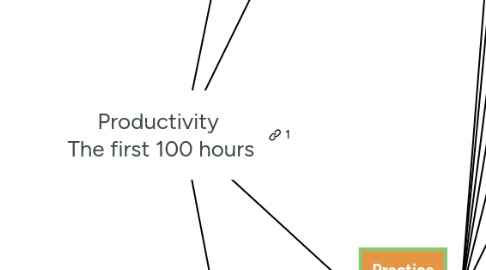
1. Expectations
1.1. Formulate your "why" in a single, clear sentence
1.2. Journal for clarity
1.3. Do your Ikigai and Map of Life
1.4. Delegate the urgent but not important tasks
1.5. Say no to the wrong things
1.6. Get better at SMART goal-setting
1.7. Plan your work and life effectively
1.8. Improve in using the 80/20 rule
1.9. Do proper time blocking and auditing
1.10. Improve your sleep hygiene further
1.11. Improve on your ability to power nap
1.12. Establish productive workout routines
1.13. Track your habits
1.14. Learn about nutrition and eat the right ingredients
1.15. Increase your positivity
1.16. Understand the science of timing
2. Prepare
2.1. Start by reading the material provided in the skill tree
2.2. Spend about 15 minutes reading material for the first four weeks
2.3. Review what you read after one week and one month after first reading it.
2.4. Overall, spend about 7-10 hours on reading and understanding the concepts proposed in this phase.
3. Practice
3.1. Do the right things.
3.2. Have a clear life goal - your "why".
3.2.1. Do your Map of Life and Ikigai.
3.2.2. Use the 5 whys method
3.2.2.1. Start by asking yourself: "why do I do what I do?"
3.2.2.2. To your answer, ask why again.
3.2.2.3. Do that at least 5 times to get a proper answer.
3.3. All the above exercises should be done in a journal.
3.4. Review the resources we've included and in this skill tree
3.5. Delegate the urgent but not important tasks.
3.5.1. Delegate to someone who would find it important and also has the capacity to do it. .
3.5.2. Create a plan for this.
3.5.3. Hire an assistant if it makes sense.
3.5.4. Involve colleagues, friends or family otherwise.
3.5.5. Once the plan is done, put it into practice right away.
3.5.6. Reflect on your experience, refine your process, and improve.
3.6. Learn to say "No" to things that affect your productivity negatively
3.6.1. Find a way to make it impossible for you to say yes to the wrong things.
3.6.1.1. Print a list and keep it in front of your work environment (or your fridge at home)
3.6.1.2. Get creative here
3.7. Improve upon what you learned during the last phase, including SMART goals, the Eisenhower Matrix, improving sleep hygiene, and more.
3.7.1. Spend at least one hour per week refining the techniques you learned.
3.8. Include power napping in your routine
3.9. Start building routines and habits.
3.9.1. Start with atomic/micro habits you can do in less than 5 minutes.
3.9.2. Look into compound habits.
3.10. At some point during the first few weeks, start looking at nutrients that promote good health and provide energy.
3.10.1. Check out the resources that show you exactly what you should be eating to increase your energy.
3.10.2. Start eating them
3.11. Read the books we've included in the "when" section of this skill tree
4. Ponder
4.1. Ponder on the usual questions:
4.1.1. What went right?
4.1.2. What went wrong?
4.1.3. How can I improve?
4.2. Near the end of your 100 hours, reflect on the following questions:
4.2.1. Have I found my life purpose? If so, what is it? If not, why not?
4.2.2. Have I succeeded in doing my Map of Life and Ikigai? If not, why not?
4.2.3. Have I delegated tasks to others successfully? What went right? What went wrong?
4.2.4. Have I learned to say no? What was the easiest? What was the hardest?
4.2.5. Have I improved upon what I learned during the last phase? How so?
4.2.6. Have I built good routines and habits? What are they? If not, why not?
4.2.7. Have I succeeded with time auditing and blocking? Why or why not?
4.2.8. Have I been able to power nap successfully a few times? Why or why not?
4.2.9. Have I researched the best nutrients to eat and have I made the right changes? How so?
4.2.10. Have I understood the concepts of "when" and applied some of them? How so?
